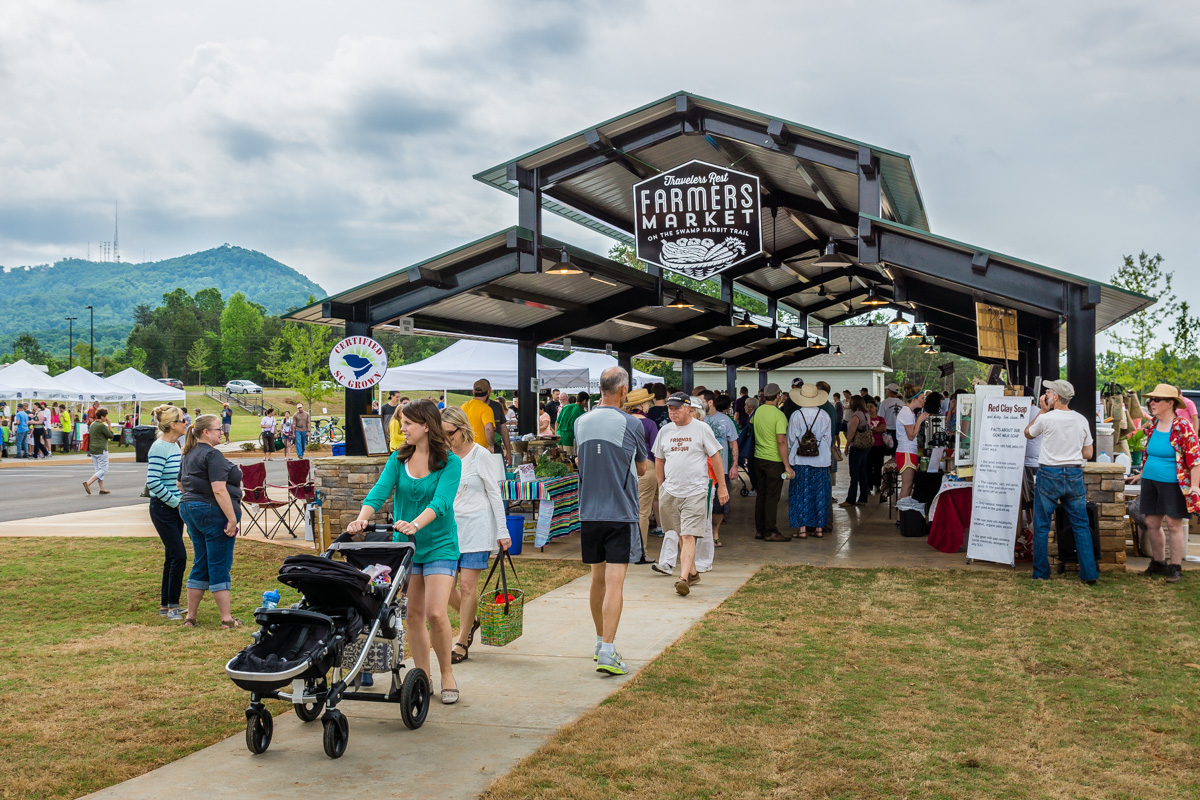
Travelers Rest Farmers’ Market
By Ciranna Bird, CFSA Member and Medical Writer for Farmers.
Spring is here and it’s time to get fresh fruit, vegetables, meat, eggs, and dairy products from your local farmers’ market! Some of these products get sold out quickly in the day, so arrive early and bring a cooler to keep your items cold while you do the rest of your shopping.
Learn about the types of markets, questions to ask your farmer and practical ways to support your local farmers to ensure they can stay in business for years to come.
DOWNLOAD THESE QUESTIONS TO TAKE WITH YOU TO TALK TO YOUR FARMERS!
Market Type: What’s the percentage of growers vs resellers at your farmers’ market?
The first thing you want to know is your market’s ratio of growers, resellers, artists, and value added product vendors. Growers are the farmers that are selling plants, fruits, vegetables, meat, dairy, and eggs they have grown, raised and harvested. In contrast, resellers buy unprocessed fruits, vegetables, meat and eggs from growers and resell these unprocessed products. Artists sell items they have created such as pottery, photography, flip flops, jewelry, candles, woodworking and soap. Value added product vendors use ingredients bought from growers and transform them via processes such as baking, canning, or juicing. Baked goods, juice, jams, pickles, dog bones, and lamb’s wool dryer balls are all value added products.
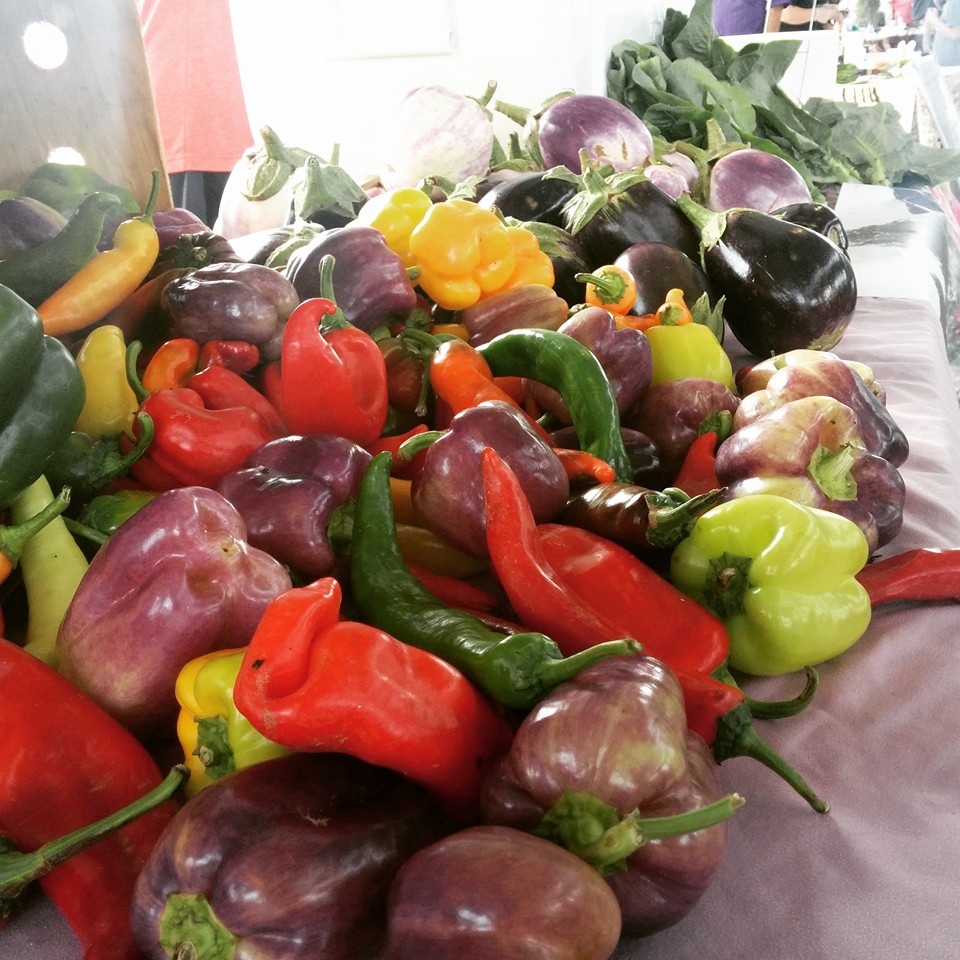
Travelers Rest Farmers’ Market peppers
Each market has a different policy on the amount of booths occupied by non-growers. To learn about your market’s policy have a conversation with its market manager. You can do this prior to attending, or in person at the market manager’s booth.
For this article, I interviewed Adrienne Hawkins, the market manager of the Travelers Rest Farmers Market. At her market, which is the largest independent non-profit farmers market in South Carolina, 50% of the Travelers Rest Farmers Market vendors are growers, 0% are resellers, 20% are artists, and 30% are vendors that make value added products from scratch and have at least one ingredient sown, grown and harvested within a 100 mile radius of the town. A market that has no resellers is great if you are looking to do your weekly grocery shopping and buy from local farmers. In case you are shopping at a market that allow resellers, here are some questions to ask the vendors.
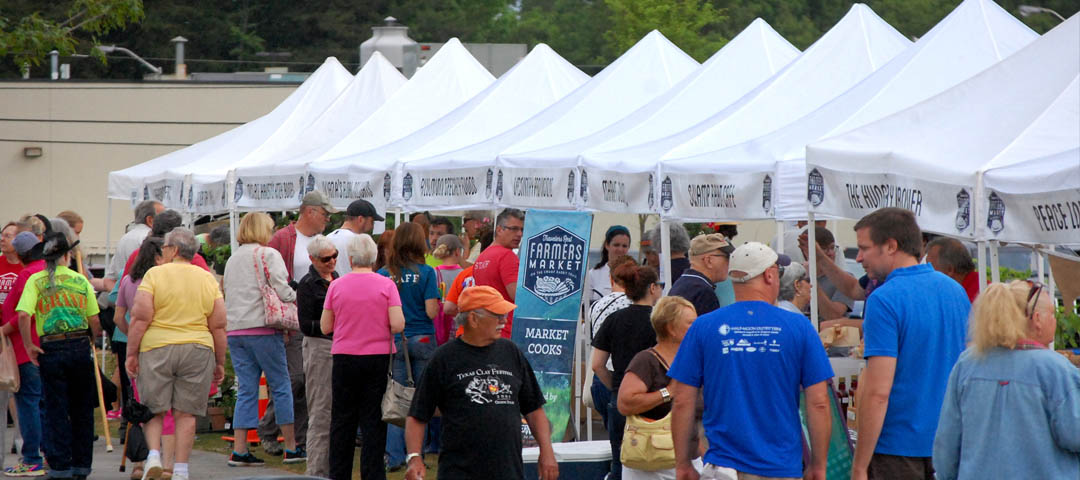
Travelers Rest Farmers’ Market
1. Which products at your stand are the ones that you grew/raised/harvested yourself?
2. Where do you source these other products?
3. How many of the ingredients for this jam, bread, jar of pickles were sown, grown and harvested within 100 miles of here?
Questions to ask your growers, more commonly known as your farmers:
This past weekend, I field tested some of the following questions at my local farmers’ market.
The best questions are open-ended rather than yes or no questions, because they allow the farmers’ expertise and passion to shine.
When I mentioned my natural tendency to avoid making eye contact to the farmers I spoke with, I learned I’m not the only shopper who keeps their eyes glued on the fruit and vegetables until they know they are ready to make a purchase. The farmers reassured me that they enjoy the opportunity to share details about their work regardless of the customer’s ability to buy something from them on that particular day.
Also, try to choose a time when your farmer isn’t swamped with customers; and remember that in order for them to stay in business, they must be able to attend to all the people at their booth.
Are these fruits and vegetables organic?
Organic produce certified by the United States Department of Agriculture (USDA) is the gold standard for shoppers concerned about soil fertility, the use of environmentally safe products, and the biodiversity of crops and animals. These vegetables and fruits are grown on soil that hasn’t been treated with synthetic fertilizers, herbicides or insecticides for at least three years. The USDA certification assures you that your farmer has a written plan to cycle resources, promote ecological balance, and conserve biodiversity. The farm is annually inspected and maintains the following records: soil and water test results, pest and disease monitoring logs, tillage and cultivation logs, planting and harvest records, post-harvest handling and storage reports, field activity records, and product sales records.
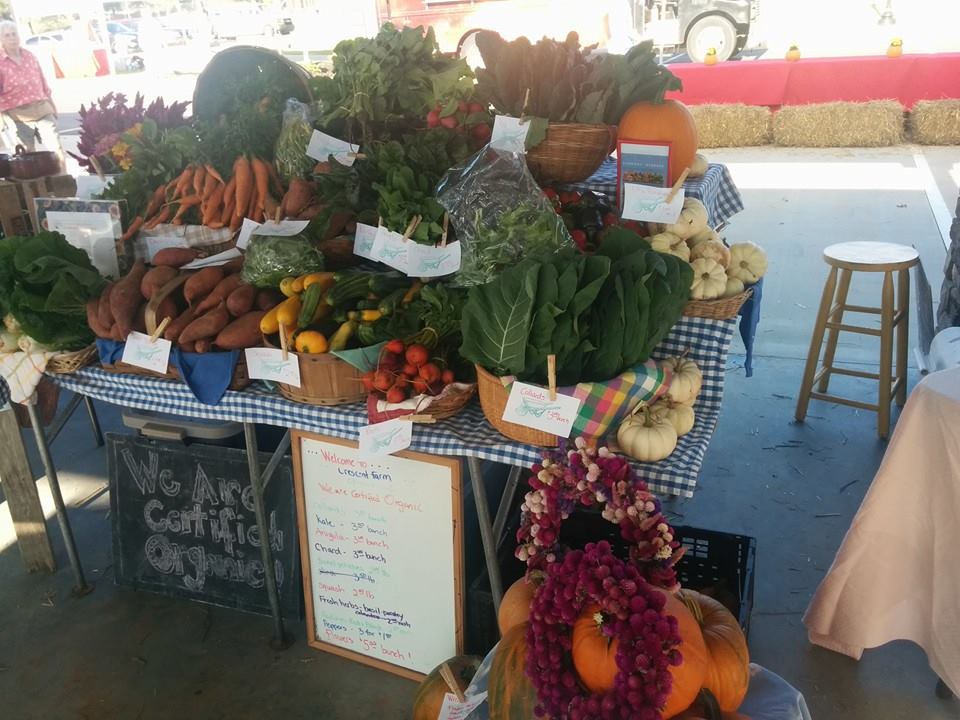
Certified Organic at the Travelers Rest Farmers’ Market
It is important to note that there are not a lot of farmers at markets in the Carolinas that are organically certified by the USDA. In 2009, the North Carolina State University Department of Agricultural and Resource Economics conducted a Farmers’ Markets in Central North Carolina survey. Of the 75 farmers that responded only a small percentage certified organic produce (1). As of April 2016, the USDA Organic Integrity Database lists 133 farms in North Carolina, and 29 farms in South Carolina that are registered to grow organically certified vegetables and fruits (2).
If the vegetables and fruits are not organically certified by the USDA, you can still ask the farmer about the following sustainability practices.
4. How many of your vegetables and fruits are grown from certified organic seeds and transplants?
5. How do you handle pests and weeds?
6. What motivates you to handle the pests and weeds in this manner?
Tips for buying eggs, dairy products, and meat at the farmer’s market:
If you have forgotten your cooler, ask your farmer if they would be willing to keep your purchased items in their cooled space while you finish shopping, checking out cooking demonstrations, and soaking in the community atmosphere of the farmers market.
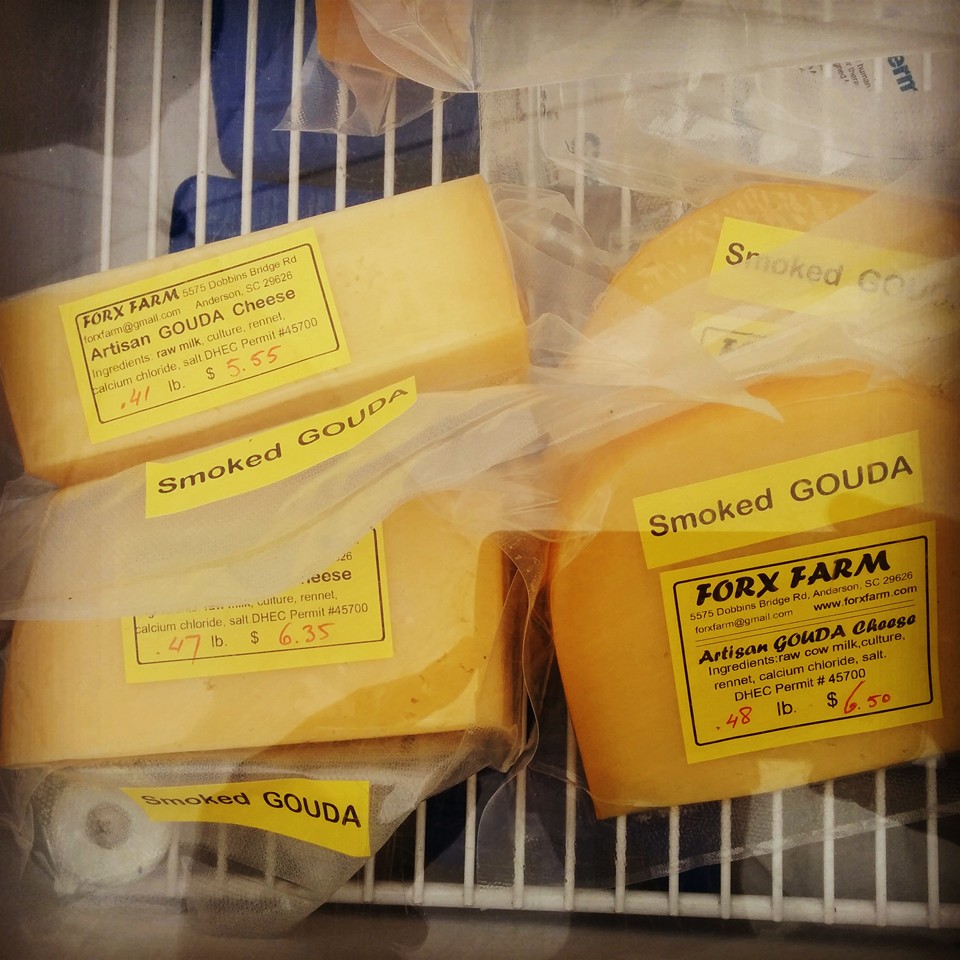
Forx Farm cheese at the Travelers Rest Farmers’ Market
To prevent cross-contamination use a separate bag to hold your eggs, from the bag that holds your vegetables and fruits. Insider tips: Eggs sold at market in NC may not be washed (which is a good thing!) and still have a natural protective coating on their shells. Remember to rinse the eggs with warm running drinking water from your sink right before you cook and eat them.
USDA certified organic meat, dairy or eggs has come from livestock that have received at least 30% of their nutrition from pasture with a minimum of 120 days of grazing per year; have been fed organic and non-genetically modified food, and have not been treated with antibiotics (3). Even if the meat, dairy, or eggs are not USDA organically certified you can ask you farmer about their practices.
7. What do you feed your chickens, pigs, lamb, goats, or cows?
8. What is your policy on the use of antibiotics or hormones?
9. How much access to the outdoors do your animals have?
Support the farmers who follow the practices you value:
Asking the questions above will help you find the farmers who maintain and improve soil fertility, conserve resources, manage pests in way that is safe for the environment, preserve and enhance biodiversity of crops and animals, and/or care for their livestock humanely. Here are follow-up questions to help them stay in business.
10. What’s the best way to stay in contact with you? (Facebook, e-mail, website, Instagram)
11. What farming associations or certification programs do you belong to?
12. Aside from buying your products, are there other ways I can support your farm?
You’ll be surprised on what fun activities your farmer may suggest. It may include posting pictures and positive reviews on the social media channels they use. In response to this question, I got a few invitations to become a farm hand for a day from in exchange for a tour. You can also join, volunteer and read newsletters from farming associations they belong to, in order to stay current with the issues they face.
Now that you have plenty of questions to ask, get out to your local farmers’ market and connect with your farmers. To find the market closest to you, visit the NC Farm Fresh website or the South Carolina Department of Agriculture website.
Another great way to support your farmers? Join CFSA! We’re working towards a food future that is good for consumers, good for farmers and farmworkers, and good for the land.
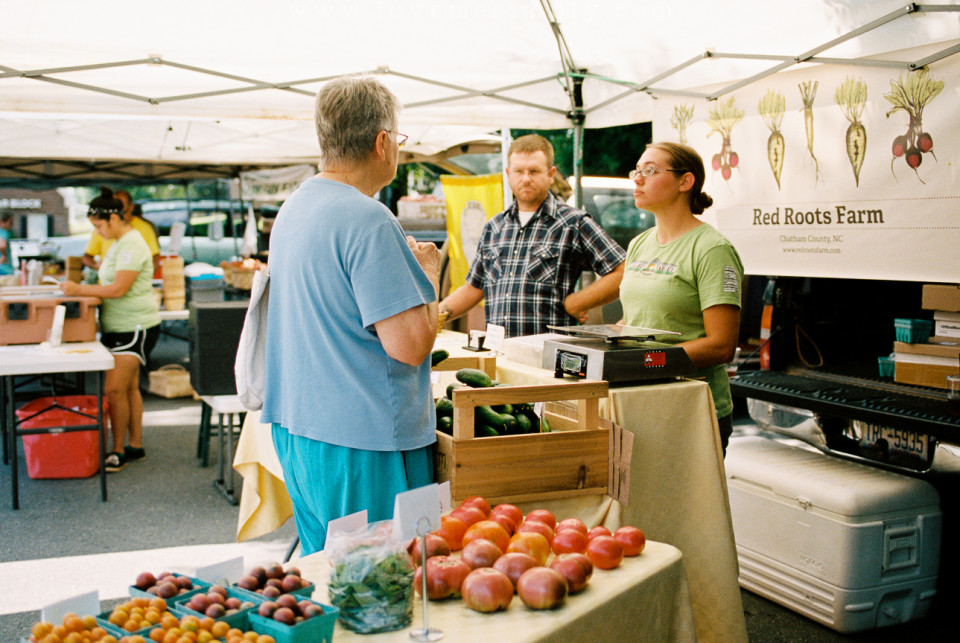
Pittsboro Farmers’ Market, photo by Lea Ciceraro – www.lovemesimply.com
Ciranna Bird helps local farmers educate their customers on the health benefits related to small-scale pasture-based production of meat, dairy, and eggs. In July, she will present a workshop entitled, Keep your hens, customers, and family healthy; Prevent foodborne diseases caused by Salmonella at the Inter-faith Food Shuttle. She loves touring farms, attending CFSA events, and writing articles and website content that promotes local farmers. Prior to becoming a medical writer for farmers, Ciranna was a supervisor of a public health microbiology laboratory. She has a Master degree in Epidemiology.
References
- Renkow M, Georgiade, N. Farmer’s Markets in Central North Carolina: Who buys, who sells, and why. Dept. of Agricultural and Resource Economics, North Carolina State University; 2011.
- https://apps.ams.usda.gov/integrity/ Organic INTEGRITY Database. Search conducted on April 8, 2016.
- US Department of Agriculture. Organic Labeling at Farmers Markets. USDA National Organic Program, Marketing Service; 2015. Pg. 1 https://www.ams.usda.gov/sites/default/files/media/Organic%20at%20Farmers%20Markets.pdf


